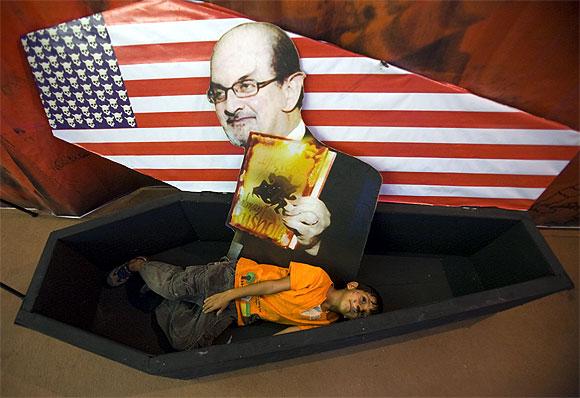
Salman Rushdie's book The Satanic Verses was banned by India four months before Iran's Supreme leader late Ayatollah Khomeini issued a fatwa for his killing without any proper examination or a judicial process, writes the controversial author in his memoirs.
"The Satanic Verses was denied the ordinary life of a novel. It became something smaller and uglier: an insult. And he became the Insulter, not only in Muslim eyes but in the opinion of public at large," Rushdie writes in his memoir Joseph Anton on his hiding days after the fatwa.
In excerpts from the book published in The New Yorker, he said but for a few weeks in the fall of 1988, the book was still "only a novel" and he was still himself.
The book was then shortlisted for the Booker Prize along with novels by Peter Carey, Bruce Chatwin, Marina Warner, David Lodge and Penelope Fitzgerald.
"Then on Thursday, October 6, 1988 his friend Salman Haidar, who was deputy high commissioner of India in London, called to tell him formally, on behalf of his government, that The Satanic Verses had been banned in India," he writes in a third person account. Haidar later became India's foreign secretary.
"The book had not been examined by a properly authorised body, nor had there been any semblance of a judicial process. The ban came, improbably, from the finance ministry, under Section 11 of the Customs Act, which prevented the book from being imported. Weirdly, the finance ministry stated that the ban did not detract from the literary and artistic merit of his work. Thanks a lot, he thought," Rushdie says.
Click on NEXT for more...

The first death threat was received four days later on October 10 at the London office of his publisher Viking Penguin and the day after that, a scheduled reading in Cambridge was cancelled by the venue because it, too, had received threats, he says.
The fatwa by Khomeini came much later on February 14, 1989.
Rushdie believes he faced criticism for the novel, which a section of Muslims described as an affront to their religion, because his opponents refused to see him as a "serious writer".
Defending himself, Rushdie says he took more than four years to finish the book and "when people tried to reduce it to an insult, he wanted to reply, I can insult people a lot faster than that."
"But it did not strike his opponents as strange that a serious writer should spend a tenth of his life creating something as crude as an insult. This was because they refused to see him as a serious writer," he said.
The author recalls that seeds for his novel were sown during his Cambridge days in 1966 and the novel "was growing in him" in 1984 though its exact nature was eluding him.
On how his character Gibreel Farishta developed, Rushdie writes about Amitabh Bachchan's near fatal accident in 1982 during the shooting of Coolie in Bangalore and south Indian stars portraying gods in movies.
"In 1982, the actor Amitabh Bachchan, the biggest star of the Bombay cinema, had suffered a near-fatal injury to his spleen while doing his own movie stunts in Bangalore. In the months that followed, his hospitalisation was daily front-page news. As he lay close to death, the nation held its breath; when he rose again, the effect was almost Christ-like. There were actors in southern India who had attained almost god-like status by portraying the gods in movies called mythologicals. Bachchan had become semi-divine even without such a career".
Click on NEXT for more...

"But what if a god-actor, afflicted with a terrible injury, had called out to his god in his hour of need and heard no reply," he writes.
On an earlier occasion, Rushdie had said Gibreel was a mixture of two or three types of Indian movie stars, which included Bachchan and N T Rama Rao.
On taking the pseudonym 'Joseph Anton' during his hiding days, he writes, "he thought of writers he loved and tried combinations of their names. Vladimir Joyce. Marcel Beckett. Franz Sterne. He made lists of such combinations, but all of them sounded ridiculous.
"Then he found one that did not. He wrote down, side by side, the first names of Conrad and Chekhov, and there it was, his name for the next eleven years. Joseph Anton," he says.
"He had spent his life naming fictional characters. Now, by naming himself, he had turned himself into a sort of fictional character as well. Conrad Chekhov wouldn't have worked. But Joseph Anton was someone who might exist," he says.
The writer notes that the "ironic truth" was that, after two novels that engaged directly with the public history of the Indian subcontinent, he saw "this new book as a more personal exploration, a first attempt to create a work out of his own experience of migration and metamorphosis".
Rushdie writes that 1988 ended badly for him, amidst accusations that he had insulted Islam in the book.
"In order to attack him and his work, they had to paint him as a bad person, an apostate traitor, an unscrupulous seeker of fame and wealth, an opportunist who 'attacked Islam' for his own personal gain. This was what was meant by the much repeated phrase 'He did it on purpose'," he writes.
Rushdie added, "Well, of course he had done it on purpose. How could one write a quarter of a million words by a accident?"
"The ironic truth was that, after two novels that engaged directly with the public history of the Indian subcontinent, he saw this new book as a more personal exploration, a first attempt to create a work out of his own experience of migration and metamorphosis. To him, it was the least political of the three books," he said.
Click on NEXT for more...
...